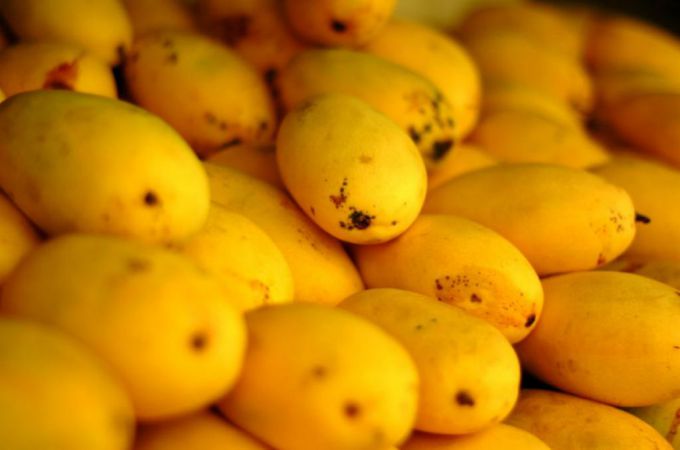Ah, the Mango, what a delectable treat that we humans enjoy eating. However, did you know that dogs like us people can eat mangoes and in fact, it’s a very fruit treat for them? So can dogs eat mangoes and gain some health benefits from this fruit? Indeed they can and if you want more about canines eating mangoes, go ahead and read the article below.
Are Mangoes Good For Dogs?
Aside from being a delicious tropical healthy fruit treat for your pet’s diet, the mango contains many minerals and vitamins essential for our dog’s continuing good health and well-being. Many dog owners and veterinarians recommend and agree that mangoes, along with watermelon, pineapples, and apples, must be part of a canine’s diet.
But bear in mind one crucial thing about the mango: while it is true that this fruit is healthy, only some parts of it are edible. You can only serve the mango’s flesh to your dog, and you need to remove the rest of the mango. Mango parts like the pits are potential choking hazards; seeds contain cyanide, thus poisonous to canines and the skin, causing digestive problems.
Just remove the pits, seeds, and skin before serving your pet the fruit. Also, remember that the mango is not the main meal food but a snack treat. To avoid giving too many mangoes to your dog for the fruit ceases to become healthy at this point.
Mangoes Health Benefits
Knowing that this fruit is right for your pet is one thing; to understand why precisely the mango is a healthy fruit for dogs is another thing. If you want to know what specific health benefits do canines gain from mangoes, please read the lists of health benefits below:
- Strengthens the dog’s immune system. A robust immune system can prevent or mitigate many diseases that tend to affect your pet.
- Low cholesterol levels ensure that your pet won’t suffer from diabetes, Cushing’s syndrome and hypothyroidism. This situation is helpful to dogs that have a genetic predisposition to high cholesterol levels or hyperlipidemia.
- Prevents constipation by keeping your dog’s stool soft, regular, and painless for a comfortable poop time.
- It provides energy for your pet’s physical activities. This effect is due to the natural sugar that is present in a mango.
- Some vitamins and minerals can stabilize the insulin level of canines. This particular health benefit helps a dog that is suffering from diabetes.
- Significantly improves the eyesight of canines. When a dog grows older, its vision slowly declines; however, a mango’s vitamins and nutrients can mitigate this condition—Mangoes aids in dealing with nyctalopia (night blindness) and dry eyes.
- Promotes growth in young puppies and prevents the quality of the skin as well as hair from going bad.
- Prevents the dog’s muscles from weakening, sudden pains and losing mass. Also, it stops the paralysis of respiratory muscles that causes the canine to have breathing difficulties.
- Maintains the standard functions of electrolytes, which act as conduction for electrical charges that affects the muscles, heart, and nerves.
- Significantly improves your pet appetite, which in turn prevents unwanted weight loss.
How Many Mangoes Can I Give to my Dog?
There is no exact limit for serving mangoes to your dog per day, at the very least. The number of mangoes your pet can eat depends on your judgment and discretion. Large dog breeds can eat a lot, but smaller dog breeds have less space in their stomach. The best advice when serving your pet mango is not to overfeed it. You can give just a few small pieces of mangoes a day, but do not feed your dog too many mangoes at once. Your pet will end up with a painful stomach ache or diarrhea.
If the canine is allergic to mangoes, then there’s no sense in continuing to feed it with mangoes.
Can Puppies Eat Mangoes?
Puppies can eat mangoes, and in fact, it is a good idea to make a puppy get used to eating mangoes if you are planning on adding this fruit to its diet. Serve the mango in tiny bits first to see the pup’s reaction and if it likes mango.
Give your puppy just enough mango bits that its stomach can take since it is quite small. Also, make sure that your puppy’s weaning period is over and that it can eat solid food.
Can Dogs Eat Mango Leaves?
Well, dogs can eat the leaves of mangoes. Unless your pet has the digestive system of a cow, goat, sheep, giraffe, or any other animal that can eat as well as digest leaves, then the answer is no.
Can Dogs Eat Mango seed?
Similar to apple seeds, your dog should never ingest the seeds of a mango. Mango seeds contain a high concentration of cyanide that can be harmful to your pet. The good news is that ingesting the seeds doesn’t necessarily mean that your dog is in danger of instant poisoning. However, ingesting too many mango seeds will cause a huge cyanide buildup in a canine’s body. Once this situation happens, the cyanide will cause some problematic health issues with your dog and may prove fatal in the long run.
There is the matter of mango seeds getting stuck in a canine’s body. The dog’s digestive system cannot break down the seeds; thus, it remains in its stomach and intestines causing problems. There will be unusual changes in your pet’s appetite, thirst, and stool habits. Behavioral changes, along with a feeling of lethargy, are some signs of mango seeds stuck in your pet’s body.
How to deal with the problems of seeds is simple enough; remove them. It takes a minute or two to remove seeds before giving the mango to your dog. Should the seeds start visibly affecting your dog or if you suspect that something wrong happened to your pet, then get your dog to the veterinarian for a checkup. Better safe than sorry.
Mangoes Nutrients That Are Good For Dogs
You now know that mangoes are healthy fruits for dogs, but what is in a mango that makes it one of the healthy fruits to eat? Mangoes contain lots of vitamins and minerals that are useful to the continuing good health of your pet. Here are some of those vitamins and minerals:
- Vitamin A – If your pet is having problems with itchy skin and its coat colors are dull-looking, then it needs Vitamin A to remedy those problems. This vitamin is also necessary for protecting the lining of the lungs, liver, and kidney. Also responsible for building up body tissue in your pet.
- Vitamin B6 – Neurotransmitters, proteins, and hormones are chemicals that carry signals between nerve cells and Vitamin B6 plays a big part in producing them. Also, it maintains the balance of the physical and mental health of the dog.
- Vitamin C – Your pet experiencing too much stress is a bad thing in the long run. Lower resistance to disease and slow recovery from illness or injuries is due to lack of Vitamin C. An intake of Vitamin should prevent these health problems, and it also helps in a canine’s hip dysplasia as well as arthritis problems.
- Vitamin E – Sometimes, doggie meals have many free radicals that are harmful to your pet. This vitamin acts as an antioxidant by protecting the body cells from damage due to free radicals. The protection reduces or stops liver, nerve, heart and skeletal muscle damage.
- Vitamin K – A vital component when it comes to clotting blood correctly. Canines who have a deficiency in Vitamin K tend to bleed in excess, be it internally and externally.
- Potassium – Supplementing your pet with potassium will improve its muscles, nerves and enzyme health. Older canines need potassium to maintain their proper health. Old age in dogs brings about kidney failure or chronic kidney condition, which results in potassium deficiency.
- Pectin – Pectin is a highly soluble dietary fiber that functions as anti-constipation and anti-diarrhea fiber. Dietary fiber encourages the spread of microorganisms that are useful and helps the dog’s body. These microorganisms, which are beneficial or benign, assist in the digestion process to break down the food.
- Magnesium – More than 300 enzymes depend on magnesium to act as a catalyst or activator for the canine’s metabolic functions. Additionally, magnesium is a cofactor that maintains the membranes’ electrical balance, regulates calcium movement into muscle cells and stabilizes the muscles’ contractile strengthen.
- Antioxidants – What we call antioxidants are anticarcinogen or carcinopreventive agents that prevent cancer. If your pet is susceptible to cancer, then anti-oxidants can mitigate its situation. Some examples of antioxidants are quercetin, methyl gallate, isoquercitrin, gallic acid, astragalin, and fisetin. Anti-oxidants also prevents coat allergy, skin problems and promote the immune system’s activity.
- Protein – If there’s a nutrient in mango with multiple roles in maintaining a dog’s well-being, protein would be that nutrient. Protein builds as well as repair muscles along with other body tissues. Growing new hair, building muscle tissues and new skin cells are other functions of the protein. The creation of enzymes and hormones for normal body function is due to protein. Finally, protein fortifies the immune system of your pet and is provides energy like carbohydrates.
A word of caution on the vitamins and minerals above: they can do many good to a dog’s health if taken in moderate doses. If you’re going overboard by feeding too many mangoes to your pet, then it’s no longer a healthy thing to do. Some of the vitamins and minerals above can be toxic or harmful to canines if ingested in large quantities without any moderation.
Tips on How to Prepare Mangoes for Your Pets
It’s fairly evident that you cannot give your dog mangoes whole and uncut. Your pet has no means to tear the fruit apart, so it’s up to you to prepare the fruit before serving it. Here are some helpful tips on how to make a mango before serving it to your pet:
- Wash the fruit thoroughly before anything else. Bacteria, as well as pesticides, tend to stick to the fruit’s skin, and you certainly don’t want the two of them getting inside your pet’s body.
- Once the mango is clean, you can now remove the skin. Even if you did wash the fruit to the point that there’s no bacteria or pesticide, it is still not edible. Mango skin has urushiol, a toxic chemical that causes an allergic reaction in your dog.
- The next part is essential since you have to remove both the seeds and pit of the mango. Mango seeds, due to its cyanide content, are harmful to a canine’s health, and the pit is an all-too-obvious choking hazard.
After removing the non-edible and dangerous parts of the fruit, it is time to cut or slice the flesh. Even with the removal of the skin and pit of the mango’s flesh, it is still too big for your pet to consume. Mango chunks can block a canine’s intestinal tract while some dogs don’t even bother to chew the fruit. There’s no standard way of cutting the mango into manageable small bits or pieces since dogs come in various sizes. Just cut or slice your pet enough pieces that its stomach can manage.
You may choose to serve the mango by itself or add it to other fruits like watermelon or pineapple. Don’t give the mango as the main meal though you can add it. Give the mangoes as snacks, treats, or dessert.
Conclusion
Now that the answer to the question “can dog eat mangoes” is a definite yes, then, by all means, give some to your dog now. Remember to keep the serving of mangoes in moderation since too much of these fruits are not healthy for your pet.
With a sweet, delicious taste along with lots of healthy nutrients and vitamins, your dog will love to eat this fruit. Your pet deserves the best treat, so don’t deny it such an excellent fruit!
READ MORE:
- CAN DOGS HAVE GRAPES?
- CAN DOGS HAVE TOMATOES?
- CAN DOGS HAVE COCONUT & COCONUT OIL?
- BAD AND GOOD FRUIT FOR DOGS
- BEST VEGETABLES FOR DOGS




Nice post.
You can give the dried mangoes certainly to your dog. But you should keep it in mind that the mangoes should be natural. While drying process, do not add sugar or other fruits with mangoes.
Wonderful information.
Helping me a lot to feed my pup.
I love to read the articles like this. keep it up.
Regards
Nice one, thank you for sharing this post. After reading this post, I don’t any doubt on a dog can eat mangoes. After preparing mangoes as per your guidance, I’ve given to my dog.